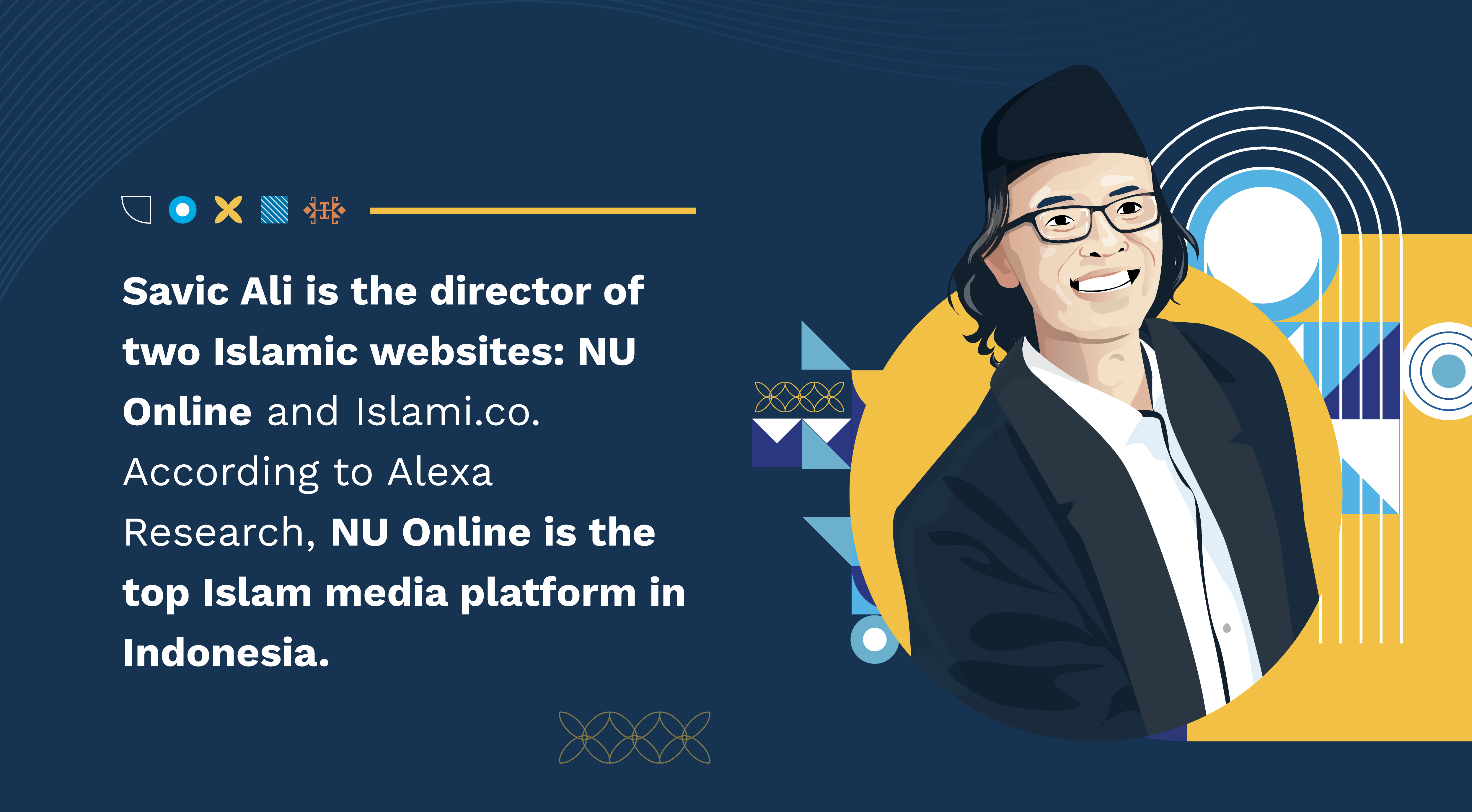Savic Ali is the director of two Islamic websites: NU Online and Islami.co. For a number of years, he has been tackling online religious extremism. He is also a member of Gusdurian Network and has continuously worked tirelessly to create bridges between religious communities.
Interviewer: According to Alexa search, NU online is the top Islam media in Indonesia. The top 3 has been dominated by the media in the theme of multiculturality. Congratulations on your achievement that NU Online has become the most popular Islam website in Indonesia. What does it mean for you and for Indonesia?
Savic Ali: First, I am happy and grateful for this achievement, It has been a continuous effort for many years and we actually became the top Islam media site 2.5 years ago. It means that NU Online has been the most visited media and people read our website the most compared to other Islam media. We are glad that recently people have shifted to our website, because there were many years where we felt most people were reading the Islam media in the theme of ultra conservatism, wahabism, or salafism. We had thought it was difficult to shift this battle as we assumed that other sites might have stronger backup and donors to continue producing the narratives of ultra conservatism, whereas our team consists of young people who do the work in their spare time voluntarily, not as a full-time job. So with this achievement, we are glad that now there is a shift, we are proud that the battle map has changed so that we have become the reference of Islam media in Indonesia for people to understand Islam online.
Interviewer: Does it mean that there is a shift for our society especially how young people shift to the thematic Islam Media?
Savic Ali: I think so. We’ve seen a shift in young people today because they are more likely to read our website. There are some people who become radicalized because of what they read and there are moderate people who want to read the moderate thematic. We will never know the reason exactly, but one thing is for sure, there are many young people who are turning to websites like NU Online and Islami.co. In the past, it was not like this, many websites promoted ultra-conservative themes causing many people to be more close minded. But, many have shifted to be moderate because they have alternative media sources- websites like ours that give them a different, multicultural perspective, helping people become more moderate in their views. In the last couple of years, we’ve also seen an encouraging shift through Alexa data- more viewers of other Islamic websites overlapping with ours. It means we can earn trust from them and be able to attract their attention to learn Islam from us also. There is comparative thinking, which is a good sign that people are developing critical thinking.
Interviewer: What are the trends of Islamic media now?
Savic Ali: I think people nowadays have a broadened perspective about Islam. In the past, moderate figures were passive and a silent majority, but now there are many moderate figures in Youtube like Gus Baha, Quraish Shihab, and many people are following their content. They are becoming reference figures in learning Islam.
Interviewer: What are the trends of intolerance you are seeing in online platforms now?
Savic Ali: Generally, intolerance has decreased on online platforms. For example, on Twitter there are now less accounts that promote hate speech and intolerant narratives. There are still anonymous accounts, but they are not really into the hate and intolerance narratives, they are more interested in political Islam. This means they are not representing the fanatic Muslims and puritan groups. So, in general I think the expression of hatred is lower. There are still many people online sharing intolerant views, but they are a small group, mostly interested in spreading propaganda. Their agenda is about politics, ideology and finances, but I think they are not a good representation of the real Indonesian society.
Interviewer: How would you classify Islamic media right now?
Savic Ali: I have classified Islamic media into 4 different areas: Ultra conservative, Political, Commercial, and Multicultural. I think the first is now stagnant, not really growing- they are associated with sufism, wahhabism and Saudi Arabia oriented: those who are not at peace with democracy, art and music life. The second is more interested in political Islam- they are also stagnant, their viewers are getting lower. In the past, they had a high number of readers, while the more moderate Islam media was getting fewer. They used to have a strong voice in the media because of the political polarization during the Jakarta Governance Election. The third, commercial websites, tend to use controversies to gain more traffic on their website, and more money through viewers. Due to their interesting content, commercial websites still have a high following, but do not see continuous growth. Finally, multicultural websites are now at the front line to influence society. They are a voice proclaiming a message to accept democracy and coexistence with plurality.
Interviewer: Are the collaborators from different websites promoting multiculturalism working together?
Savic Ali: Yes, we are collaborating, we often meet and share with each other. I am sometimes mapping the concentration- for example, I encourage Alif.co to focus more on Islam and culture. We are all sharing content and encouraging more writers to each media.

